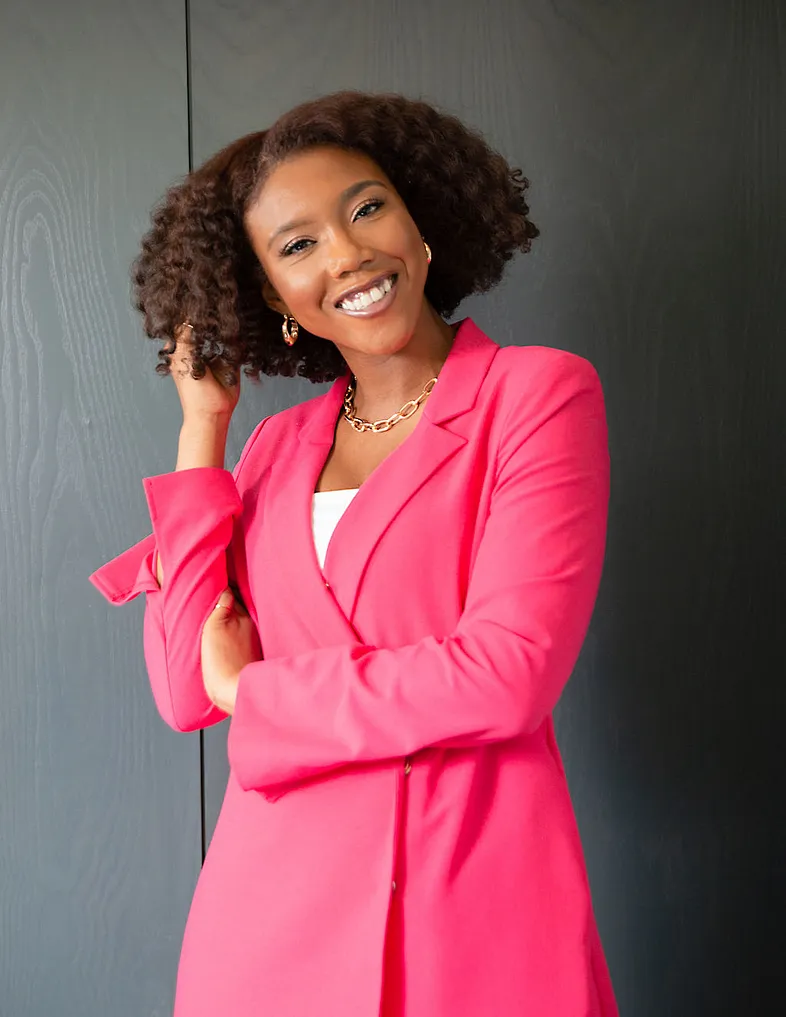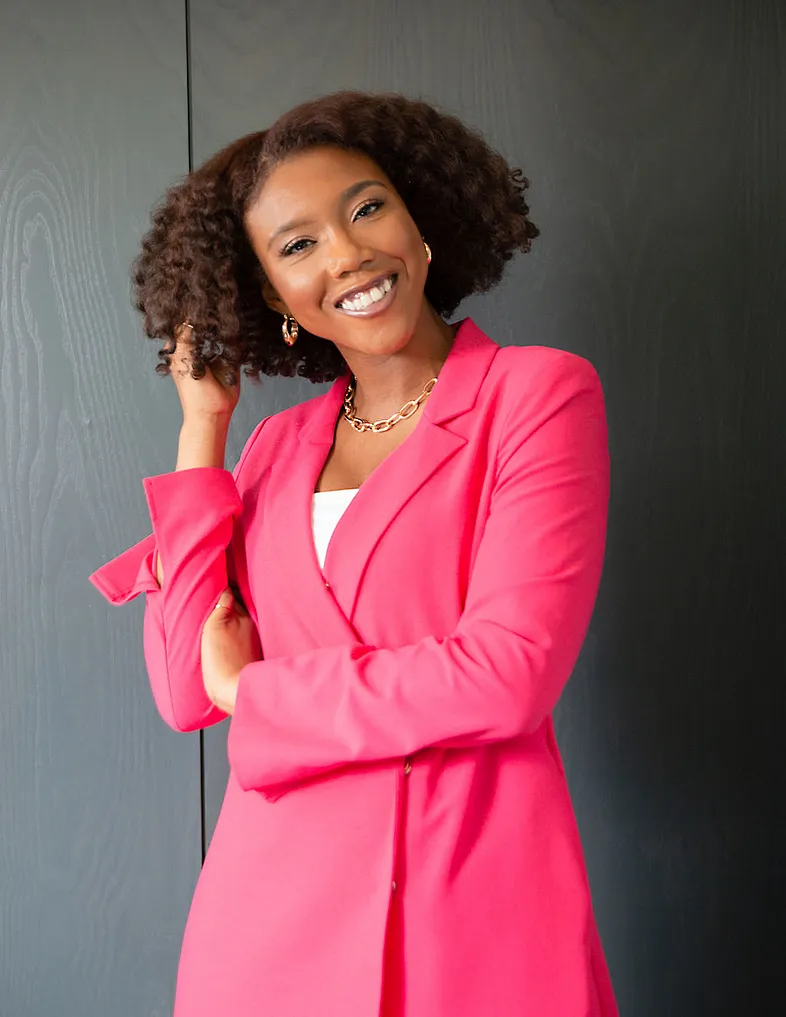
Image via Shante Elliot
Shante Elliot was working as a director for a child advocacy organization that served as appointed court advocates within the foster care system in Cook County, Illinois. Home to the city of Chicago, Cook County is known to have a disproportionate number of Black children within the foster care system — as much as 70%. Additionally, the State of Illinois leaves teens guarded by the state in jail for months at a time, including those who have been wrongfully accused. In 2021, 84 such cases existed.
Foster placement shortages and housing insecurity cause significant instability, stress, and trauma for children within the foster care system. But Elliot noticed that as a byproduct, it also causes children to disengage with the educational and support systems they need to be successful after they leave the foster care system.
“I wanted to understand how we could better support young people in foster care, the educational side of their cases, and those who live outside the scope of the advocacy organization,” says Elliot. “I wanted a way that would allow us to continue engaging with young people no matter where they live. Where my mind went to was technology.”
TasselTurn is a tech-enabled platform providing youth in foster care a custom plan to graduate from high school and college. So far, the company has attracted investments and partnerships from prestigious organizations such as Echoinggreen, camelback ventures, AT&T, and L’Oreal Paris.
Read this week’s Founder Feature to learn more about how this digitalundivided X Cosmopolitan 2022 The New C-Suite founder Shante Elliot uses technology to change the foster care system to improve children’s educational and life outcomes.

Image via digitalundivided Instagram
digitalundivided: Why is TassleTurn a needed solution for children in the foster care system or for those young adults coming out of the foster care system?
Shante Elliot: What’s often under-addressed is that our child welfare system — by way of its origin and charter—is designed to ensure that protection, physical safety, and the basic needs of young people who were removed from their homes are met. Foster Care is not designed to educate children. It doesn’t have the capacity to personalize a child’s experience. Yet as we continue to lean on the foster care system to educate children, we will continue to get the unfortunate outcomes we see daily.
Tassle Turn serves as a collaborator for foster agencies in the child welfare system, because all we do is concentrate on education. We understand these young people's trajectory and educational path — from a professional level, lived experience level, and just knowledge of education.
digitalundivided: Would you be willing to share a meaningful story about one of the children within the TasselTurn program?
Shante Elliot: One of our early students signed up for TasselTurn during his sophomore year in high school. His GPA was a 2.1. By academic standards, it was low. It wasn’t necessarily a college-going type of GPA. But he had several aspirations to attend college.
So when Omar came to us, we matched him with an educational coach on our platform. Along with his coach, he received online academic tutoring and a personal coach throughout his 10th, 11th, and 12th-grade senior years.
Fast forward, and Omar will be graduating college next month in May. He was able to come and share his journey with TasselTurn at South by Southwest just a few months ago. He also talks about it on our Instagram page, as well—personalization matters. When we can personalize experiences, we can better identify a person’s needs and then address those needs.
digitalundivided: For those who may not know what it means to be a socialpreneur like yourself, can you tell us more about that experience?
Shante Elliot: My leadership style is servant leadership — a leadership style identified with great leaders, like Dr. Martin Luther King, Jr. And so by that, social entrepreneurship is what spoke most to me. I started my first organization in my sophomore year of college. I worked in schools and mentored students, and the local school district acquired the curriculum we developed from that organization. I always knew that whatever I did, I wanted to do good work and help people.
There’s one leader that I admire, John O’Brien. He says you must make money like a capitalist to give it away like a socialist. In some ways, that’s almost how I think about social entrepreneurship. At my core, I’m a do-good person. I introduced a scalable technical solution to solve a very human problem, a very social problem.
I look forward to the social entrepreneurship space because there are multiple funding models. Our model is a combination of impact investing, as well as traditional philanthropic grants. I continue to look forward to our traditional philanthropic side and funders, recognizing that technology is a player in this space. If they continue educating themselves on that, the industry will grow. There have also been similar models, such as B-Corp, things like that. But I think with social entrepreneurship, you have to be able to play the long game a little longer than the traditional entrepreneur, and I’m all for it.
digitalundivided: Thank you, that’s such a great answer. How did participating in digitalundivided and Cosmo’s The New C-suite support your journey as a founder?
Shante Elliot: I would like to think that our journey is still unfolding. More immediately, we saw opportunities to share our story in different spaces present themselves, such as South by Southwest. We also increased some of our investment from our current network of financial supporters. The New C-Suite also allowed us to scale out our work even more and take advantage of many professional development opportunities, such as navigating the social or PR sides. Of course, the media was a benefit for us.
digitalundivided: You’ve had such great success this past year. What is the next milestone you wish to achieve in your entrepreneurial journey?
Shante Elliot: I think a big win for us will be creating a direct referral system for tax returns. By this, we mean that, if you look at the data, we know that once a young person is aged 13 and remains in foster care in any capacity, it is very unlikely they will be adopted. That means they will likely age out of the foster care system. What we want to do as a company is create a direct referral system with the state government that says as soon as the young person hits age 13, they’re automatically signed up for tax returns. And so that will be a big win for us. That’s something that we’re hoping to be able to pilot in the city we’re headquartered in, which is Chicago.
__________
May is National Foster Care Awareness Month. If anyone would like to refer a foster youth who will benefit from TassleTurn’s services, apply directly at tasselturn.org. Learn more about Foster Care Awareness Month on TassleTurn’s social media page.
Are you a startup founder on your way to becoming the next revolutionary CEO? digitalundivided and our friends at Cosmopolitan are excited to announce recruitment for 2023’s The New C-Suite! The New C-Suite is an elite cohort of today’s top-rising women of color entrepreneurs who are redefining leadership in American business. What are you waiting for? Build your legacy and start your application process today here!
[Editor’s note]: This interview has been lightly edited from its original transcription.

